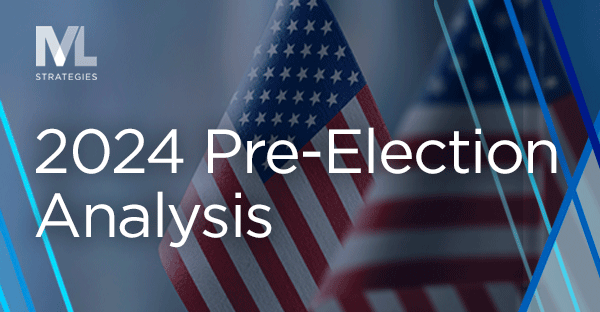
Trade & International Affairs
Viewpoints
Filter by:
2026 Tax and Trade Policy Outlook: How Tax Reconciliation, Extenders, Tariffs, and Trade Reviews Will Shape Federal Policy
February 6, 2026| Article
This installment of the ML Strategies 2026 Policy Outlook Series explores reconciliation proposals, tax extenders, tariffs, USMCA review, and geopolitical pressures shaping federal policy.
The Impact of U.S. Steel and Aluminum Tariffs: What You Need to Know
February 20, 2025| Blog
Last week, the president signed proclamations to ”close existing loopholes and exemptions to restore a true 25% tariff on steel and elevate the tariff to 25% on aluminum.” Significantly impacting the global trade landscape, these measures are the latest in a series of protectionist policies from the Trump administration aimed at boosting domestic production and addressing national security concerns.
2024 Pre-Election Analysis: International Trade
September 9, 2024| Advisory
Read about international trade priorities that may be pursued by the presidential candidates Donald Trump and Kamala Harris in the latest edition of our 2024 Pre-Election Analysis series on how the November 2024 election will impact the legislative and regulatory landscape.
US-Canada Cross-Border Quick Guide
August 12, 2024| Advisory
This pre-election analysis from ML Strategies will explore some of the most pressing cross-border issues that will be tackled by the next administration and 119th Congress. Here are some topline takeaways from key issues.
2024 Pre-Election Analysis: US-Canada Cross-Border Issues
August 12, 2024| Advisory
Read about some of the most pressing cross-border issues that will be tackled by the next administration and 119th Congress in the second edition of our 2024 Pre-Election Analysis series on how the November 2024 election will impact the legislative and regulatory landscape in a variety of areas.
2020 Congressional Highlights
January 15, 2020| Advisory
DHS’s Final EB-5 Regulations: What Stakeholders Need to Know
August 5, 2019| Alert
Read about DHS’s Final EB-5 Regulations that will take effect on November 21, 2019, including a new standard minimum investment amount of $1.8 million.
ML Strategies Outlook for 2018
December 5, 2018| Advisory
Washington Post-Election Check List
November 1, 2018| Advisory
ML Strategies Capitol Hill & Executive Branch Fall Preview
September 6, 2018|
With Labor Day now behind us, Washington returns to a fairly significant workload for September and October in the run-up to the midterm elections in November. The House is in session for the next two weeks before returning home for a state work period (Sept. 17-21). Theoretically, they will then return to DC for three weeks—through October 12—but there's a good chance they will adjourn before that date so that members can campaign in their districts. Although not exhaustive, the following is ML Strategies’ guide on what to watch over the next few months from Capitol Hill and the Executive Branch agencies. While all issues addressed in this update may not be completed before the midterms, we anticipate that they will take up the bulk of the legislative and regulatory agenda. With that said, the Senate has taken up the nomination of Brett Kavanaugh to serve on the Supreme Court and that process has the potential to impact the agenda on other items. With that said, the Senate has taken up the nomination of Brett Kavanaugh to serve on the Supreme Court, and that process has the potential to impact the agenda on other items. We expect the Senate, which remained in session throughout its normal recess period in August, will likely continue to focus on Judicial and Executive branch nominations.
President Signs Legislation Reforming CFIUS & Export Controls
August 28, 2018| Alert
Congress has continued its 57-year tradition of passing an annual defense authorization bill with the John S. McCain National Defense Authorization Act (NDAA) for Fiscal Year 2019 finalized by Congress on August 1 and signed into law by President Trump on August 13. The NDAA makes important reforms and updates to the process by which investments in U.S. businesses by foreign persons are reviewed by the Committee on Foreign Investment in the United States (CFIUS) and updates and codifies Department of Commerce practices related to export controls.
#MLWashingtonCyberWatch: 2017 FTC and Google Complaint
January 4, 2017| Blog
Google’s recent changes to its privacy policy are coming under fire from a complaint filed late last year with the Federal Trade Commission (“FTC”) that accuses the company of downplaying “transformational change” in its handling of user data.
EB-5 Regional Center Program to Get Short-Term Reprieve with Passage of Continuing Resolution
September 30, 2015| Alert
Coinciding with the end of the current fiscal year, the EB-5 regional center program is set to expire today but will get a temporary reprieve with expected final passage of a Continuing Resolution (CR) that will fund the government through December 11 and also temporarily extend the regional center program through that same date.
EB-5 Regional Center Program to Get Short-Term Reprieve with Passage of Continuing Resolution
September 30, 2015| Blog
Coinciding with the end of the government's fiscal year, the EB-5 regional center program is set to expire today. However, it will get a temporary reprieve with expected final passage of a Continuing Resolution (CR) that will fund the government through December 11 and also temporarily extend the regional center program through that same date.
EB-5 Program Reauthorization: Proposed Legislative Reforms
July 7, 2015| Blog
An alert by Douglas Hauer, Member, Alexander Hecht, ML Strategies - Vice President of Government Relations, and R. Neal Martin, ML Strategies - Senior Manager of Government Relations, details proposed legislative reforms to the Immigrant Investor Program, more commonly known as the "EB-5 Program."
EB-5 Program Reauthorization: Proposed Legislative Reforms
July 6, 2015| Alert
Created by the Immigration Act of 1990, the Immigrant Investor Program, more commonly referred to as the EB-5 program, offers foreign investors an opportunity to secure permanent residency in the United States by making a minimum capital investment of $1 million per investor into a New Commercial Enterprise (NCE) that will create at least 10 jobs for US workers.
US Sanctions as Diplomacy Tools and Political Weapons: Complexities and Opportunities for the Business Community
February 5, 2015| Alert
In response to a number of foreign policy crises encountered over the past few years, the Obama Administration has sought a new and more aggressive approach to using sanctions to advance US global security goals.
Explore Other Viewpoints:
- 2024 Pre-Election Analysis
- AI: The Washington Report
- Artificial Intelligence
- Biden Administration
- Crisis Communications/Strategic Public Relations
- Disability & Special Populations
- Education
- Energy & Sustainability
- Energy & Sustainability Washington Update
- Federal Government Relations
- Financial Services
- Health Care
- Life Sciences & MedTech
- Post-Election Analysis
- Real Estate & Project Development
- State & Local Government Relations
- Telecommunications & Technology
- Trade & International Affairs
- Transportation


